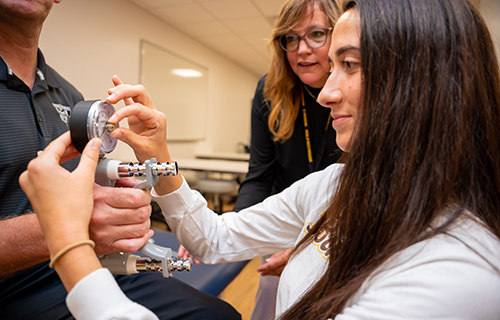It's a common question: In preparing for a career as an occupational therapist, what is the best undergraduate major to pursue? The simple answer is there isn’t a specific undergraduate degree that you must obtain before earning a degree in occupational therapy. Occupational therapists come from a variety of backgrounds.
DOWNLOAD A PRINTABLE PDF OF THIS DOCUMENT
 What's the best undergraduate degree to pursue in preparing for a career in occupational therapy?
What's the best undergraduate degree to pursue in preparing for a career in occupational therapy?
It's a common question among undergraduate students looking to further their studies by gaining a master’s degree in occupational therapy. The simple answer is that there isn’t a specific undergraduate degree that you must obtain before earning
a degree in occupational therapy.
Occupational therapists come from a variety of backgrounds. However, it is best to earn your degree in a relevant area, making transitioning into an occupational therapy career easier. You can explore some of these undergraduate degrees that St. Bonaventure
University offers below.
Psychology
An undergraduate degree in psychology may seem like a weird path to help you earn a master’s degree in occupational therapy. Surprisingly, it’s a common choice.
Occupational therapy requires you to work closely with clients and
patients who could be recovering from severe illness or disability. As you might imagine, a serious condition takes a physical toll on a patient, and a mental one. A background in psychology can help an OT understand psychological and physical barriers
to healing and thriving. Occupational therapists familiar with mental conditions, concepts, and recovery can better support their clients as they go through treatment.
Sociology
An undergraduate degree in psychology may seem like a weird path to help you earn a master’s degree in occupational therapy. Surprisingly, it’s a common choice.
Occupational therapy requires you to work closely with clients and patients who could be recovering from severe illness or disability. As you might imagine, a serious condition takes a physical toll on a patient, and a mental one. A background in psychology
can help an OT understand psychological and physical barriers to healing and thriving.
Occupational therapists familiar with mental conditions, concepts, and recovery can better support their clients as they go through treatment.
Biology
Biology’s focus is on molecules, cells and the human body. A background in biology introduces students to information, concepts and skills that can be beneficial when you’re pursuing a degree such as occupational therapy.
The required laboratory that is part of a biology education will prepare you for the advanced research expected of you as you earn your master’s degree. Biology students who choose to pursue a master’s in occupational therapy are encouraged
to take as many human and patient-focused courses as possible.
This would allow you to be better prepared for the challenges of working with clients.
Education
It may seem out of place, but one of the core functions that an occupational therapist performs is to teach someone who has experienced an illness or injury to reach their highest level of independence or improve their quality of life.
OTs with a background in education or teaching have great insight into the structure of learning and how to set achievable goals. Education majors also might find great joy in working with children needing occupational therapy, and discover that they
are particularly suited to serving young patients.
Health Science: Kinesiology and Social, Physical & Psychological Development
St. Bonaventure University’s health science major prepares students who want to pursue graduate studies in occupational therapy (MS, MOT, MSOT). Kinesiology and social, physical and psychological development study the human body’s movement
and natural physiological adaptations to exercise.
When you earn a degree in health science, you’ll be prepared to:
- Demonstrate knowledge in human anatomy, physiology, behavior, development and movement.
- Evaluate and analyze research related to human nutrition, health and exercise.
- Conduct health, fitness and performance assessments on individuals and use that information to develop exercise programs for them.
The path to a career as an occupational therapist is not a singular one. Many practicing OTs have arrived at their current career from various backgrounds. Gaining a spot in a master of occupational therapy program has multiple nuances beyond completing
one particular undergraduate program.
Most programs, including ours at St. Bonaventure, look at prerequisite courses and other application requirements to determine admittance.
Our admissions advisers and program faculty will take the time to work with students demonstrating a passion for the field of occupational therapy to help them qualify for consideration.